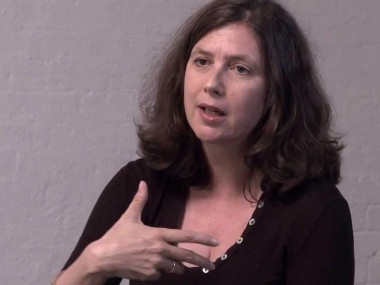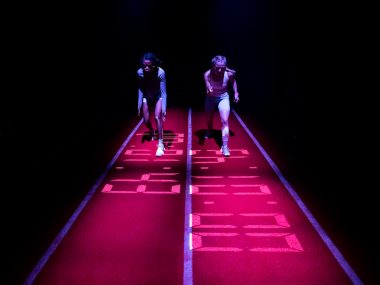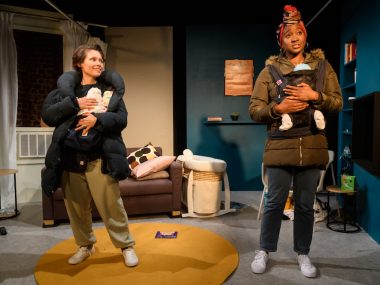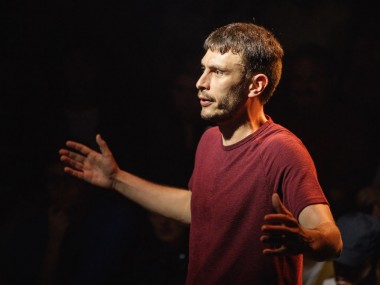Paradise Now!, Bush Theatre
Monday 19th December 2022
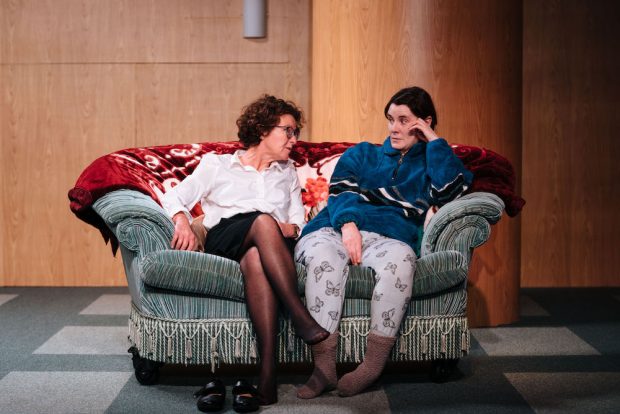
How many plays pass the Bechdel Test? Originally featured in a comic strip, and popularised in film criticism, it simply states that to pass this test your story has to have: 1) at least two women in it; 2) who talk to each other; 3) about something other than a man. Well, one of the brilliant things about Irish writer Margaret Perry’s new dark comedy, Paradise Now! is that it passes this test with an A Plus grade. Its cast is six women, who talk all the time, and men are simply not part of the conversation. When, at one point, one of the women mentions her husband the others are shocked — they didn’t even know she was married, and that didn’t matter in the least.
Paradise is a pyramid selling scheme, which promotes essential oils and aims to create networks of women who sell its tiny bottles of bliss. The newest arrival is Gabriel, a 63-year-old Irish woman who lives with her younger sister Baby in London. Baby works in a department store and is habitually exhausted after a day on her feet, while Gabriel suffers from depression, on the dole, can barely leave the house and does a lot of daytime TV. Then Gabriel meets Alex, a Paradise seller who is keen to sign up women to join her team. Her patter is beautifully satirized, and if you can swallow the unlikeliness of Gabriel paying £250 to join, then the rest of the play makes perfect sense. After all, she wants to buy her sister some sleep, meaning earn some cash so her sibling can work less.
As Gabriel begins to get a taste for the rewards of ambition, and the scent of essential oils, other characters cross her path. Cork-born Carla, a young wannabe TV presenter, is drawn to Paradise while her girlfriend Anthie, a dancer, is more focused on a career in the arts, attending audition after audition. Then there is Laurie, who Alex says she remembers from school, but whose desperation suggests that she will be unable to focus on the cutthroat job of selling and building networks. All six women come together at the Paradise Now! annual event, presided over by Fiona, the She-E-O of the company, where Garbriel’s work is celebrated in a way she could never imagine.
As a satire, the play shows the downside of ambitious freelance lifestyles, where female empowerment is a feelgood rhetoric that conceals merciless hard work and the cheating at the cruel heart of all pyramid selling schemes. Along the way, there is a tension between how the women, who all want to connect, sway between supporting each other and competing with each other. The ethics of women selling overpriced products to other women is questioned, and the sexual desire of the young ones is shown to be compromised by the demands of the market. No need for any men at all. In one scene, two women hook up while another flatmate sobs loudly in the next room. But they are indifferent to that woman’s pain.
Perry’s writing has a quietly intense quality that mixes sharp satire with broader comedy and an undertow of desolation. There is much sadness here, and at least one scene is powerfully moving. The possibilities of internet sales, and the joys of YouTube and TikTok, are balanced by the material on depression, desperation and loneliness. Female friendship is a quality that can be monetized, and therefore exploited, and the character of Laurie is shown to be struggling under the pressures of ambition and other people’s expectations. By contrast, the slickness of Alex’s sales pitch conceals her own personal uncertainties; likewise, the Insta-loving Carla has her own secrets. The only really human relationship is the sister love, with its bickering and making up, of Gabriel and Baby.
Both the play text and Jaz Woodcock-Stewart’s direction have a strange rhythm in which slow often underplayed scenes are contrasted with loud moments of pop music (a banging soundtrack), and some frenzied moments of dance and acting out of savage emotions. The running time is about 2 hours and 45 minutes so the pace is unhurried and the temptation to edit the story into a shorter, punchier play has been resisted. Perry’s vision is one that makes demands on our time, on our concentration, and on our interest in the characters and their gradually evolving relationships and situations. It won’t be to everyone’s taste, but it’s worth sticking with.
On Rosie Elnile’s versatile set, which changes in an instant from living room to office, bowling alley to conference hall, the cast are uniformly good. Michele Moran (Gabriel) and Carmel Winters (Baby) share a spiky but also calm and calming sibling bond that contrasts nicely with Shazia Nicholls’s Alex, who is excitable and energized. Rather sceptical of her sister’s potential, Winters also bravely confronts taboos about showing older women’s bodies by taking off her clothes to have a bath in full view. Equally sceptical and often amused by the antics of the Paradise crowd is Annabel Baldwin’s Anthie, who follows her brightly feisty girlfriend Carla (Ayoola Smart) to work events, while Rakhee Thakrar gives Laurie a convincing edginess and anger (as well as an episode when she swoons after inhaling the scent of oils). All in all, one of the more original plays of 2022.
© Aleks Sierz

